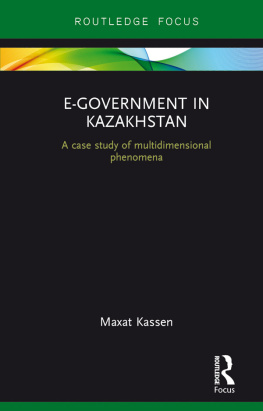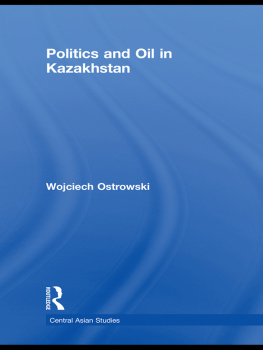E-Government in Kazakhstan
When it comes to analyzing the phenomenon of digital government, the overwhelming focus is on the most developed nations in the world, and Western countries in particular. However, Kazakhstan, a post-totalitarian country, has also proved to be successful in the development of e-government.
This book analyzes e-government development in Kazakhstan from a multitude of dimensions, including, but not limited to, political, social, economic and technological platforms. It examines the adoption of a wide range of technology-driven public sector projects and identifies the key drivers, challenges, regulation policies and stakeholders of e-government reforms in this transitional society. Taking into account recent changes in governance, such as the development of mobile government, the rise of civic engagement and the open data-driven movement, and the overall formal progress of the e-government project, this book addresses the emergence of new challenges and concerns associated with the advancement of the e-government concept. Furthermore, it suggests that a universal framework can be applied when investigating e-government projects in the developing world.
Offering a wide range of practical recommendations on how to overcome the problems associated with e-government development, this book will be a valuable resource for anyone wishing to improve their understanding of the multidimensional nature of e-government. It will also be of key interest to academics studying Political Science, Development Studies, Public Policy and Central Asian Studies.
Maxat Kassen is Associate Professor at the Eurasian Humanitarian Institute, Kazakhstan.
Routledge Advances in Central Asian Studies
For a full list of titles in this series, please visit www.routledge.com/Routledge-Advances-in-Central-Asian-Studies/book-series/RACAS
3Politics, Identity and Education in Central Asia
Edited by Pinar Akcali and Cennet Engin-Demir
4Regime Transition in Central Asia
Stateness, nationalism and political change in Tajikistan and Uzbekistan
Dagikhudo Dagiev
5Power, Networks and Violent Conflict in Central Asia
A comparison of Tajikistan and Uzbekistan
Idil Tuner-Klavuz
6From Conflict to Autonomy in the Caucasus
The Soviet Union and the making of Abkhazia, South Ossetia and Nagorno Karabakh
Arsne Saparov
7Identity and Politics in Central Asia and the Caucasus
Edited by Murad Ismayilov and Mohammed Ayoob
8Turkish-Azerbaijani Relations
One nation two states?
Edited by Murad Ismayilov and Norman A. Graham
9US Policies in Central Asia
Democracy, energy and the war on terror
Ilya Levine
10E-Government in Kazakhstan
A case study of multidimensional phenomena
Maxat Kassen
E-Government in Kazakhstan
A case study of multidimensional phenomena
Maxat Kassen
First published 2017
by Routledge
2 Park Square, Milton Park, Abingdon, Oxon OX14 4RN
and by Routledge
711 Third Avenue, New York, NY 10017
Routledge is an imprint of the Taylor & Francis Group, an informa business
2017 Maxat Kassen
The right of Maxat Kassen to be identified as author of this work has been asserted by him in accordance with sections 77 and 78 of the Copyright, Designs and Patents Act 1988.
All rights reserved. No part of this book may be reprinted or reproduced or utilized in any form or by any electronic, mechanical, or other means, now known or hereafter invented, including photocopying and recording, or in any information storage or retrieval system, without permission in writing from the publishers.
Trademark notice: Product or corporate names may be trademarks or registered trademarks, and are used only for identification and explanation without intent to infringe.
British Library Cataloguing in Publication Data
A catalogue record for this book is available from the British Library
Library of Congress Cataloging-in-Publication Data
A catalog record for this book has been requested
ISBN: 978-1-138-22070-6 (hbk)
ISBN: 978-1-315-40058-7 (ebk)
Typeset in Times New Roman
by Apex CoVantage, LLC
Contents
Maxat Kassen is a political scientist and a docent teaching students in the Eurasian Humanitarian Institute in Astana, Kazakhstan. He is a former head of foreign information service in the National Information Agency Kazinform (20032004). He is also a former Fulbright Visiting Scholar at the University of Illinois at Chicago (20112012) and fellow of the Annenberg-Oxford Summer Institute at the University of Oxford (2011). His research focuses on studying the impact of new information technologies on domestic politics and international relations, especially in analyzing the e-government phenomenon, globalization of the open data movement and transformation of the political communication channels. He has several works on digital politics and use of e-government technologies published in prestigious international high-impact factor academic journals.
In academic and professional literature, the phenomenon of digital government is usually analyzed in the context of the most developed and democratic nations of the world with a majority of case studies focused on Western countries, forgetting that it is a global trend. In contrast to the traditional tendencies in literature, the author of this book investigates the phenomena in an unusual context, resorting to the case study of a typical emerging and post-totalitarian country such as Kazakhstan and focusing on the analysis of the key drivers and challenges in the diffusion of the e-government movement to answer the ultimate question: whether it is harnessed by the members of civil society to promote civic engagement and new political communication.
In general, the results of the case study research presented in this book are useful as analytical material by providing a detailed review of various e-government, open data and e-participation projects; investigating political, economic, social and institutional challenges associated with their development; and offering a wide range of practical recommendations on how to overcome them, providing an interesting, unique and rich empirical basis for policy makers and practitioners, political scientists and journalists, as well as students of public administration and all those who seek to understand better an amazing multidimensional nature of e-government.
The primary purpose of the chapter is to outline the investigation framework of the research to help establish the correct methodological foundation of the analysis, which will mostly be based on a case study of the e-government development in Kazakhstan in its various dimensions and institutional levels, including but not limited to political, social, economic and technological ones; first, by setting the research questions and shaping the investigation skeleton of the study, determining the key areas of concentration and choosing the appropriate research methods as well as providing some generalizations on expected findings and outcomes of the research.









